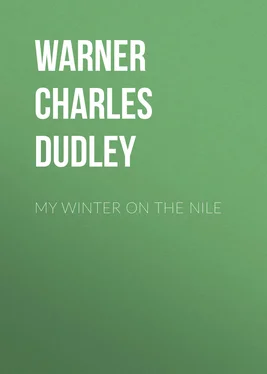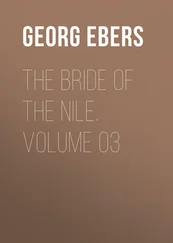Charles Warner - My Winter on the Nile
Здесь есть возможность читать онлайн «Charles Warner - My Winter on the Nile» — ознакомительный отрывок электронной книги совершенно бесплатно, а после прочтения отрывка купить полную версию. В некоторых случаях можно слушать аудио, скачать через торрент в формате fb2 и присутствует краткое содержание. Жанр: Путешествия и география, История, foreign_edu, foreign_antique, foreign_prose, на английском языке. Описание произведения, (предисловие) а так же отзывы посетителей доступны на портале библиотеки ЛибКат.
- Название:My Winter on the Nile
- Автор:
- Жанр:
- Год:неизвестен
- ISBN:нет данных
- Рейтинг книги:5 / 5. Голосов: 1
-
Избранное:Добавить в избранное
- Отзывы:
-
Ваша оценка:
- 100
- 1
- 2
- 3
- 4
- 5
My Winter on the Nile: краткое содержание, описание и аннотация
Предлагаем к чтению аннотацию, описание, краткое содержание или предисловие (зависит от того, что написал сам автор книги «My Winter on the Nile»). Если вы не нашли необходимую информацию о книге — напишите в комментариях, мы постараемся отыскать её.
My Winter on the Nile — читать онлайн ознакомительный отрывок
Ниже представлен текст книги, разбитый по страницам. Система сохранения места последней прочитанной страницы, позволяет с удобством читать онлайн бесплатно книгу «My Winter on the Nile», без необходимости каждый раз заново искать на чём Вы остановились. Поставьте закладку, и сможете в любой момент перейти на страницу, на которой закончили чтение.
Интервал:
Закладка:
“As you are a friend of Mr. Blank,” said Ali, evidently pleased with the confidence reposed in him, “you shall have the best I have, for about what they cost me.”
The Scarabæus is the black beetle that the traveler will constantly see tumbling about in the sand, and rolling up balls of dirt as he does in lands where he has not so sounding a name. He was sacred to the old Egyptians as an emblem of immortality, because he was supposed to have the power of self-production. No mummy went away into the shades of the nether world without one on his breast, with spread-wings attached to it. Usually many scarabæi were buried with the mummy—several hundreds have been found in one mummy-case. They were cut from all sorts of stones, both precious and common, and made of limestone, or paste, hardened, glazed and baked. Some of them are exquisitely cut, the intaglio on the under side being as clean, true, and polished as Greek work. The devices on them are various; the name of a reigning or a famous king, in the royal oval, is not uncommon, and an authentic scarabæus with a royal name is considered of most value. I saw an insignificant one in soft stone and of a grey color, held at a hundred pounds; it is the second one that has ever been found with the name of Cheops on it. The scarabæi were worn in rings, carried as charms, used as seals; there are large coarse ones of blue pottery which seem to have been invitations to a funeral, by the inscriptions on them.
The Scarabæus is at once the most significant and portable souvenir of ancient Egypt that the traveler can carry away, and although the supply was large, it could not fill the demand. Consequently antique scarabæi are now manufactured in large quantities at Thebes, and in other places, and distributed very widely over the length of Egypt; the dealers have them with a sprinkling of the genuine; almost every peasant can produce one from his deep pocket; the women wear them in their bosoms.
The traveler up the Nile is pretty sure to be attacked with the fever of buying Scarabæi; he expects to happen upon one of great value, which he will get for a few piastres. It is his intention to do so. The Scarabæus becomes to him the most beautiful and desirable object in the world. He sees something fascinating in its shape, in its hieroglyphics, however ugly it may be to untaught eyes.
Ali selected our scarabæi. They did not seem to us exactly the antique gems that we had expected to see, and they did not give a high idea of the old Egyptian art. But they had a mysterious history and meaning; they had shared the repose of a mummy perhaps before Abraham departed from Ur. We paid for them. We paid in gold. We paid Ali for his services as guide. We gave him backsheesh on account of his kindness and intelligence, besides. We said good-bye to his honest face with regret, and hoped to see him again.
It was not long before we earnestly desired to meet him. He was a most accomplished fellow, and honesty was his best policy. There isn’t a more agreeable Bedawee at the Pyramids; and yet Ali is a modern Egyptian, just like his scarabæi, all the same. The traveler who thinks the Egyptians are not nimble-witted and clever is likely to pay for his knowledge to the contrary. An accumulated experience of five thousand years, in one spot, is not for nothing.
We depart from the pyramids amid a clamor of importunity; prices have fallen to zero; antiquities old as Pharaoh will be given away; “backsheesh, backsheesh, O Howadji;” “I havn’t any bread to mangere , I have six children; what is a piastre for eight persons?” They run after us, they hang upon the carriage, they follow us a mile, begging, shrieking, howling, dropping off one by one, swept behind by the weight of a copper thrown to them.
The shadows fall to the east; there is a lovely light on the plain; we meet long lines of camels, of donkeys, of fellaheen returning from city and field. All the west is rosy; the pyramids stand in a purple light; the Sphinx casts its shade on the yellow sand; its expectant eyes look beyond the Nile into the mysterious East.
CHAPTER IX.—PREPARATIONS FOR A VOYAGE
WE are giving our minds to a name for our dahabeëh. The owners have desired us to christen it, and the task is getting heavy. Whatever we are doing; guiding a donkey through the mazes of a bazaar; eating oranges at the noon breakfast; watching the stream of color and fantastic apparel, swaying camels and dashing harem-equipage with running saïses and outriding eunuchs, flowing by the hotel; following a wedding procession in its straggling parade, or strolling vacantly along, knocked, jostled, evaded by a dozen races in a dozen minutes and lost in the whirl, color, excitement of this perpetual masquerade, we are suddenly struck with, “what shall we call that boat?”
We want a name that is characteristic of the country and expressive of our own feelings, poetic and not sentimental, sensible and not common-place. It seems impossible to suggest a good name that is not already borne by a dahabeëh on the river—names such as the Lotus, the Ibis, the Gazelle, Cleopatra, Zenobia, names with an Eastern flavor. And we must have not only a name for the boat, but a motto or device for our pennant, or “distinguisher flag,” as the dragoman calls the narrow fifty feet long strip of bunting that is to stream from the forward yard. We carry at the stern the flag of our country, but we float our individuality in the upper air. If we had been a bridal party we should of course have taken some such device as that of a couple who went up the river under the simple but expressive legend of “Nestle-down,” written on their banner.
What would you name a Nile dahabeëh?
The days go all too rapidly for us to catch the shifting illusions about us. It is not so much what we see of the stated sights that can be described, but it is the atmosphere in which we live that makes the strangeness of our existence. It is as if we had been born into another world. And the climate is as strange as the people, the costumes, the habits, the morals. The calendar is bewitched. December is a mixture of September and July. Alas, yes. There are the night-fogs of September, and the mosquitoes of July. You cannot tell whether the season is going backwards or forwards. But for once you are content to let Providence manage it, at least so long as there is a north wind, and you forget that the sky has any shade other than blue.
And the prophecy of the poet is realized. The nights are filled with music, and the cares that infest the day are invariably put off till tomorrow, in this deliciously procrastinating land. Perhaps, however, Mr. Longfellow would not be satisfied with the music; for it seems to be the nasal daughter of Lassitude and Monotony, ancient gods of the East. Two or three strings stretched over a sounding skin and a parchment drum suffice to express the few notes that an Arab musician commands; harmony does not enter into his plan. Yet the people are fond of what they consider music. We hear on all sides at night the picking of strings, the throb of the darabooka and the occasional outburst of a wailing and sentimental strain. Like all barbarous music, this is always minor. When the performers are sailors or common strollers, it is doubtless exactly the same music that delighted the ancient Egyptians; even the instruments are the same, and the method of clapping the hands in accentuation of the music is unchanged.
There is a café chantant on one side of the open, tree-grown court of a native hotel, in the Ezbekeëh where one may hear a mongrel music, that is not inexpressive of both the morals and the mixed condition of Cairo to-day. The instruments of the band are European; the tunes played are Egyptian. When the first strain is heard we say that it is strangely wild, a weird and plaintive minor; but that is the whole of it. The strain is repeated over and over again for a half hour, as if it were ground out of a coffee-mill, in an iteration sufficient to drive the listener insane, the dissolute scraping and thumping and barbarous dissonance never changing nor ending. From time to time this is varied with singing, of the nasal, fine-tooth-comb order, with the most extraordinary attempts at shakes and trills, and with all the agony of a moonlit cat on a house-top. All this the grave Arabs and young Egyptian rakes, who sit smoking, accept with entire satisfaction. Later in the evening dancing begins and goes on with the strumming, monotonous music till at least the call for morning prayer.
Читать дальшеИнтервал:
Закладка:
Похожие книги на «My Winter on the Nile»
Представляем Вашему вниманию похожие книги на «My Winter on the Nile» списком для выбора. Мы отобрали схожую по названию и смыслу литературу в надежде предоставить читателям больше вариантов отыскать новые, интересные, ещё непрочитанные произведения.
Обсуждение, отзывы о книге «My Winter on the Nile» и просто собственные мнения читателей. Оставьте ваши комментарии, напишите, что Вы думаете о произведении, его смысле или главных героях. Укажите что конкретно понравилось, а что нет, и почему Вы так считаете.












